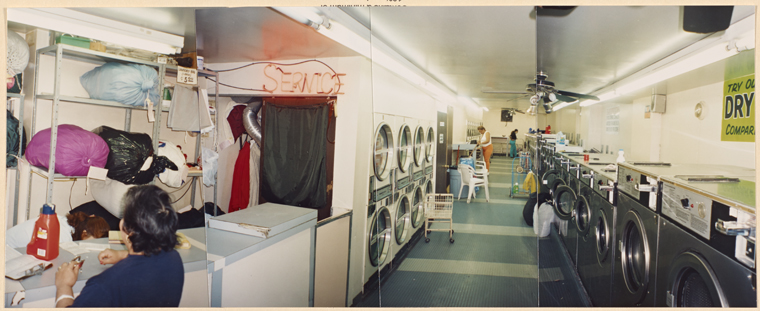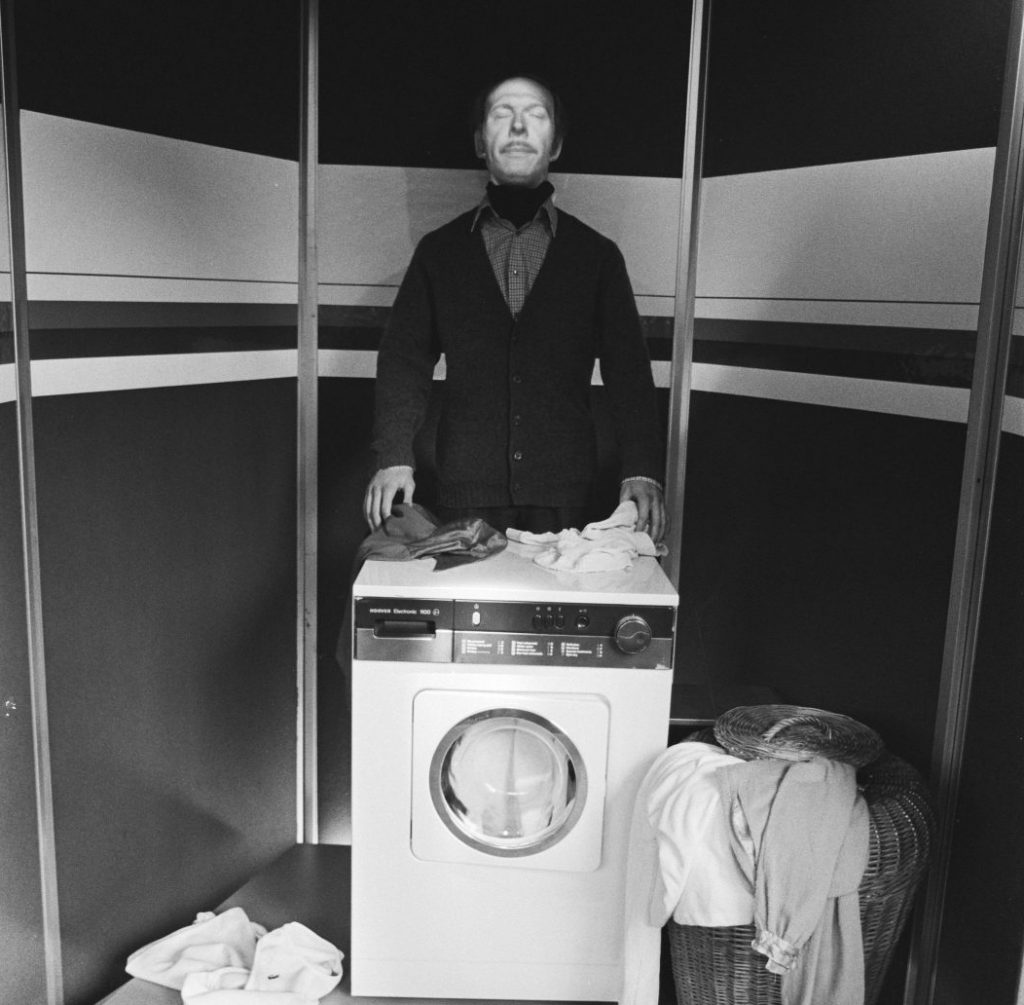“The poster for the show has a picture of Erasmus holding this futuristic light saber and then 50 feet away there’s a giant billboard that says ‘The Past is Now Useless” observes Drew Daniel, one-half of the experimental duo Matmos as I sit with him and his partner and Matmos other half, Martin (M.C.) Schmidt outside a Rotterdam hotel.
“These attitudes are an interesting contrast of wanting the historical past, wanting to feel connected to Erasmus of Rotterdam this cosmopolitan, productive author. But then we also have this feeling that it’s all junk and it’s all over and what does that matter?”
It’s an interesting observation from Daniel, who’s an Associate Professor and Director of English Literature Graduate Studies at the prestigious, Johns Hopkins University. Somehow I missed the massive yellow billboard despite walking right by it 5 minutes earlier. I don’t think the past is useless but when you’re asked enough times “why do archives exist?” you start to question yourself.
It’s not surprising to see such a sign in Rotterdam, a city where the past is kind of useless. Mostly because the city was devastated so badly during World War 2 that compared to its northern counterpart, Amsterdam, Rotterdam looks more like Cleveland than a normal Dutch city. It’s major touristic draw is contemporary architecture, not canal houses and tulips.
For Daniel and Schmidt the past is definitely not useless. In their lives outside of Matmos, Daniel writes books and lectures historic literary texts while Schmidt has just released his first solo record solo record Batu Malablab inspired by 1950s “Hawaiian” music, exoticism and traditional Gamelan. They’re tuned into the past, perhaps even more so than current trends.
On the other hand, they’re billed on a “sci-fi festival” that views itself as futuristic and they’re legendary in the realm of forward thinking experimental electronic music, uncompromising in style and methods. But don’t call them legends. Legendary to Schmidt basically translates to “fucking old”.
It’s an interesting insult/compliment. What makes a legend? Is two-decades too short or too long a time to declare someone a legend? Athletes can claim legendary status after several seasons. Actors can become legends after a few films, and musicians can become legends after one album. It’s like debating what’s considered heritage and what’s still contemporary. It’s a convoluted, relative and arbitrary mess.
Maybe “masters” is a more appropriate term for Matmos. In 10 albums they’ve gone from sampling crawfish to the Wild West, a surgical operating room to a Civil War period piece, Wittgenstein to parapsychology and now a washing machine. None of which seems too strange or esoteric. When their newest album Ultimate Care II was announced it was almost too easy to say “oh that’s so Matmos”. The album is composed solely out of sampling and playing the duo’s home washing machine, a Whirlpool Ultimate Care II.
For those unfamiliar with the duo’s sound, it’s hard to describe but it’s basically experimental electronic dance music that’s actually pleasurable to listen to. They aren’t afraid of melody, hooks and grooves but then again they aren’t afraid of noise and some listener discomfort either.
Full disclosure, Matmos were a big inspiration for RE:VIVE. We encourage artists to work within limitations and concepts to push themselves creatively and really highlight curated archival materials. So with two of the best conceptual artists in electronic music ever in front of me I had to ask, “how do you stay true to and execute a conceptual work?”
“You have to split yourself in half. I think there’s a poetics of the concept side and then a side that’s purely driven by the ear and by the pleasure of what you’re hearing.” says Daniel who’s also stated that Matmos like to have their conceptual album cake and eat it as a pop dessert too.
“I like to try and work with sound sources that might seem unpromising.” continues Daniel. But it’s more about being honest than it is about being simply esoteric. “If you have a particular sound and the point of the composition is to foreground that sound then if you amplify it massively, compress the shit out of it and then run that through a flanger and a phaser, then what you’re hearing in the end is flange and phase. So then why would you bother to record some unusual esoteric object if you’re just gonna run it through the same effect that everyone else can use”.
“Our newest album is a great example.” elaborates Schmidt. “Usually we’re making something that’s 5 minutes long, so if we’re bothering to say it’s made out of a box of matches then we feel very strongly that you should hear some ‘matchy-box-of-matchiness’ somewhere in there. Maybe it should even be a major part of it. But then on a work like Ultimate Care II [a 38 minutes album that literally follows the ebb and flow of the machine’s normal wash cycle] there’s so much goddamn washing machine we didn’t have any problems saying, now we’re gonna make a string section or an accordion that sounds nothing like a washing machine but it’s made out of a washing machine and it matters that you know that.”
In electronic music there’s a handful of producers that work within the conceptual realm and do them well; Matthew Herbert, Jeff Mills, Peder Mannerfelt, and most recently, Lakker to name just a few. On the other hand, there are dozens of labels releasing new material at such an alarming rate that taking the time to conceive and execute a concept album and do it well is not as glorified, in my opinion, as it used to be. It can leave producers behind the latest trends and make or break a career if the album sucks.

Somehow Matmos have managed to always straddle the club, experimental and indie world though. They don’t have to keep up with trends of dance music, indie or experimental, they just do their thing by only doing conceptual works. “Electronic music production has always fetishized the next sound and the next gesture or the next filigree or the new stripe that everyone has on their nose. We try to escape that by having the focus be something conceptual that’s generating the work and the work is about that rather than about trying to squeeze into the little fitted jacket.”
I think the hardest part about writing anything conceptual is commitment and it’s not something that every artist needs to do. Many will have presets already defined, parts of old songs that never came to fruition (hey, Radiohead), a constant sample bank to dig into or their pedals and amps already dialed in. Matmos, by choice, start with nothing, zero. Each new album is a blank slate. They have to define the concept, record the sounds, write the music and piece it all together. For some people staring at a blank piece of paper and being expected to paint a masterpiece would cause paralytic terror. But for these guys, they seem to thrive on it. Perhaps the past is useless after all?
They must save some things though; they can’t throw it all away. I mean, they’re academics and rather studios gentlemen, they have to have some internal librarian in them. They must be great archivists! Ehh, not really.
“We’re terrible at archiving ourselves” says Daniel, “it’s like seven layers of technological Troy. We have cassettes, diskettes, DAT tapes, zip drives, scuzzy drives, ghost hard drives of varying health and accessibility, external hard drives that need a special power supply”
Schmidt favors the DAT tape more than any of the now obsolete technologies mentioned above. In true archivist fashion he even bought a second DAT tape deck just in case something happens to the first one.
“Once something is a record it’s out in the world, it’s been finalized. You never think of yourselves entering history. You think about whatever you’re working on as the deadline that’s important. And we don’t do a lot of remixes”.
“Mostly because we’re not popular and there’s no demand for them” clarifies Schmidt. But like most artists who have built their career on sampling, the two could care less if anyone remixed or sampled their stuff. (If only more people would have that mentality). When I asked them about their website being licensed under a Creative Commons Attribution-Share Alike license and whether or not they’d release their music under the progressive licensing framework the answer is, of course. For those that don’t know what Creative Commons is, it’s a progressive licensing model that allows for re-use, sharing etc. It’s really big in cultural heritage.
Daniel already did so with the latest Soft Pink Truth (his solo project) record which is all built from samples taken without permission from YouTube. “I made that Creative Commons. I like that the Creative Commons system is baked into Bandcamp and can use the different gradients. I think that’s the most appealing thing about that model. We’re definitely sympatico.”
Blatant bootlegs are a different story though. Schmidt recalls a recent incident where a fan in Russia had mailed him a photo of a bootlegged copy of the Civil War. “In a weird way I was almost flattered. Wow, really? You think you can make money off of this?” No one seemed in rush to track down this bootlegger and bring him up on charges for his wrong doings though.
Even a major company like Whirlpool couldn’t be bothered to stop Matmos from making their entire album out of a 1993 product.
Daniel-”They weren’t gonna fund us but they weren’t gonna stop us”.
-Schmidt-“And very appropriately. Why would they care? We’re two gay guys who make experimental music.”
-“If we were really fucking popular maybe it’d be a no brainer”
-”We were told it’d cost $800 dollars for a lawyer to write a cease and desist letter. They could barely get $800 dollars out of all the profits from this record.”
The machine in question, the Ultimate Care II is no longer on the market. Daniel hypothesizes maybe it’d be different if they sampled a product currently for sale.
It wouldn’t be the same album though. Washing machines have calmed down over the years. The Ultimate Care II though is old school. It’ weighs 150lbs, it’s massive, violent and it’s analog!
“We discovered that when we went on this tour. We used transformers to take the power from 220 to 110 but it doesn’t change the cycles so it’s still 50hz so the machine runs 4/5ths slower.” clarifies Schmidt. “ The buzzer, that signals the end of the load is now lower pitched! It’s crazy. But we just learned to live with it. The first song is the most radically changed. We play with the chugging [makes choo choo train chugging gesture] and it’s kind of exciting but now our opening song is like, the dub version. It actually changes the show. It’s slightly boring now.”
However, the set was not boring. Gimmicky? A bit. But as the washing machine played its 4-minutes rinse cycle solo it hit me. There’s everything you need to write a song happening right here. A shuffle rhythm, texture, nuance, dynamics. It played itself and it played pretty well, it’s just up to the audience to get over the fact that they payed to listen to a washing machine.
Before we headed off to the venue for the show M.C. Schmidt grabbed the bronze ash tray off the table and tapped it. It makes a disappointing *ding* and he set it down, seemingly unimpressed. Already testing materials for the next record…
You can buy Ultimate Care II here via Thrill Jockey Records here.
And sample some washing machines via our newest Sample Pack “Around the House” here.
Main image via Nationaal Archief CC BY
